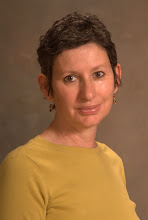No one navigates breast cancer without some sense of loss. Sometimes, when coping with a negative gain, it's best just to add up the damages and see where you're at. Only by taking stock can you get your life back on course.
For many women, their losses begin with their surgeries. Surgical removal of a breast, or a noticeable portion of one, forces women to grapple with self-image and identity. They have to make difficult choices about reconstructions and to navigate new bodies and new intimacies. My surgery was comparatively easy, and I have no complaints about the result. I was very fortunate to have skated here.
Following surgery, chemo brings its own losses. People who are only trying to be supportive console you by saying that your hair will grow back, that your hairless state is a cosmetic inconvenience. While true on an intellectual level, their well-meaning words miss the point. The way we style our hair is largely a decision that we make about ourselves. For women, hair length, cut, even color all communicate something about us. A spiky punk cut with magenta highlights sends a different message than a blond bob or grey curls. Even women who take a minimalist approach to their hair are communicating something about themselves by their lack of effort. While cancer patients can rationalize that their hair will grow back after chemo, people who involuntarily lose their locks also have to accept a simultaneous loss of control. That's why the military shores the hair of all new recruits, to send them the undeniable message that they have forfeited control over their appearance and over many other self-directed decisions.
As of this writing I'm still holding onto the hair. But I'm poised for the big shed. It's like waiting for that day in late fall or early winter when a strong wind blows in and all the remaining leaves land on the lawns. Before the wind arrives, no one knows exactly when the leaves will fall, only that we'll be very surprised if in February, the deciduous trees are still holding onto some foliage.
Although it lacks the emotional wallop of rapid balding, the impact of both chemo and radiation on your schedule is another loss. Chemo, in its inelegant style, wins by destroying all of the new cells in one's body, both the cancer cells as well as the healthy cells. For chemo to work, the doses have to be spaced out in order to increase the chances of killing all emergent cancer cells. That's why treatments are given over weeks and months. For the patient, even if you dodge most of the side effects, you still don't feel completely like yourself. Thus, plans about work and travel all have to be viewed through the prism of chemo cycles. One question for me is where will I be in my chemo cycle on my 50th birthday? Will I feel well enough to celebrate? Should I give out-of-town family and friends the go-ahead to join me for a party, or just postpone the whole thing?
A few weeks after chemo, radiation gets underway, which is a 20-minute daily treatment for five or six weeks. While we all face limitations on our time due to work or school schedules, knowing that chemo and radiation treatments are defining how you schedule your time is particularly annoying.
Finally, breast cancer makes a big dent in your sense of well-being. On the one hand, you have to grapple with the knowledge that your body is being a very nice host to some very nasty cells. On the other hand, breast cancer has no debilitating symptoms, so it betrays you by letting you feel fine. The symptoms of other diseases -- headaches, loss of energy, or pain -- are catalysts that force people to seek medical attention. Because you want the headaches to stop, you have a physical incentive to undergo treatment. With breast cancer, you have to submit to several heavy-duty medical approaches that stretch out over many months, even though you feel normal -- except for that tiny painless growth palpable in your left breast. So this disease, and its remedies, sap a measure of your good spirit. I can see it in the faces of the survivors who've taken this detour before me.
There are silver linings, too. For me, writing about this experience is a real gift to myself. Cancer also strengthens relationships, because all of the nonsense and distractions get stripped away. Finally, despite the trials of the treatment, you just have to be grateful that you found the little lump under your skin, or that your mammogram was positive, or that your doctor felt the suspicious growth that day. There are silver linings, and I suspect that, at the end of the day, they will go a long way toward countering the losses.
1/28/08
Subscribe to:
Post Comments (Atom)





No comments:
Post a Comment